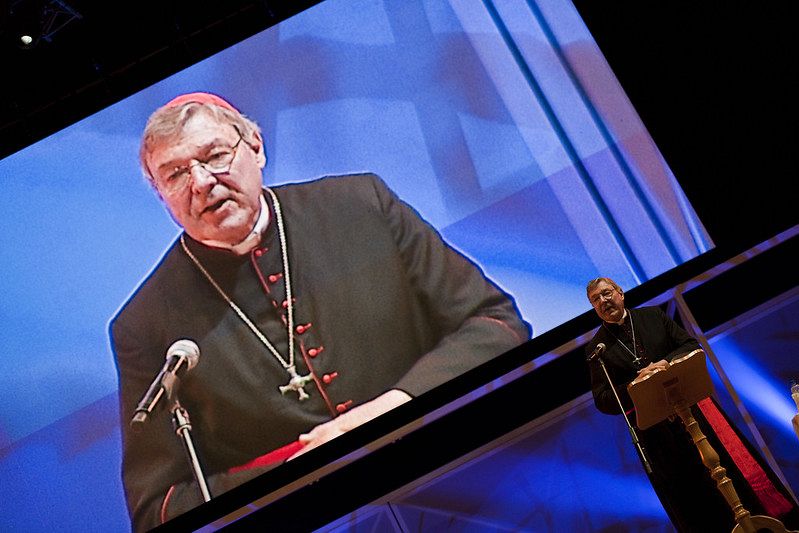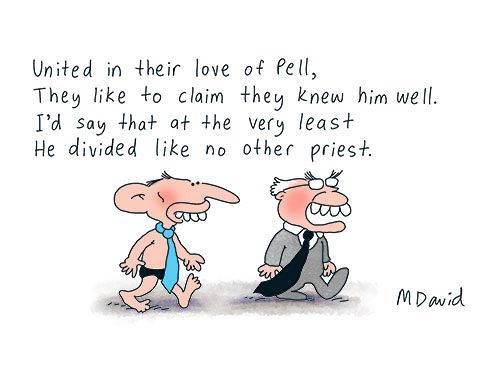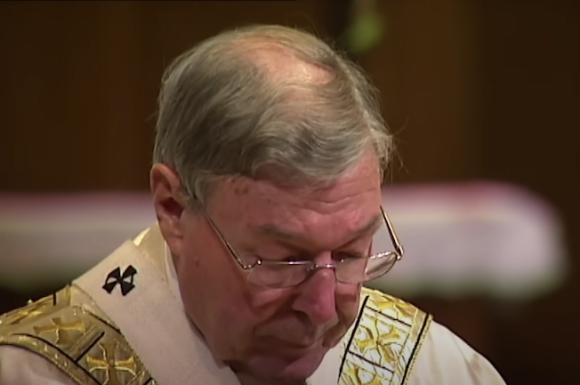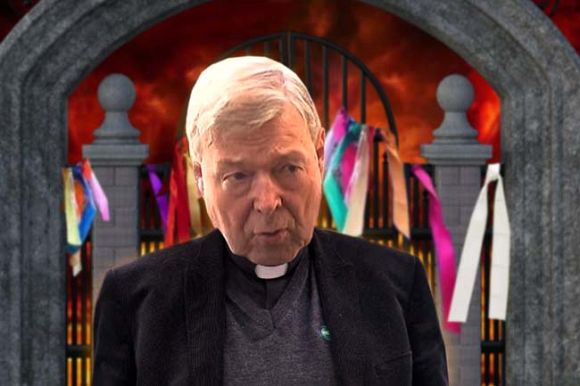The fight for justice for survivors of sexual abuse continues after George Pell's passing, writes Andrew Collins.
*CONTENT WARNING: This article discusses child sexual abuse
I WAS pissed off watching Cardinal George Pell’s funeral. Not because of the funeral. Everyone has those who love them, and everyone deserves to be able to send them off remembering good times and memories.
What upset me the most was when Pell's brother, David Pell, said:
"At the end of the Commission’s hearings in Rome, George met with the victims, the Ballarat victims and families, privately. George stated that it was very emotional, and many hugged him. The now-disgraced leader of that group apologised to him. 'Sorry George for what we did to you. We had to use your help to achieve our cause'."
Pell did meet with the survivors in Rome. I was there. I was the one who organised the meeting. It has been reported that the meeting was frosty. We had a break and I turned to the woman beside me and told her that I was going to do something. I walked up to George and hugged him. He changed. He softened and went from Cardinal Pell to George from Ballarat. The rest of the meeting went well.
And at the end, he was hugged by some more survivors. He then spoke to the media and linked the suicides to sexual abuse. This was groundbreaking. It was the first time a senior Church figure had acknowledged the link. Pell also promised to help survivors, particularly those from his hometown. So that part is all true.
But It’s the last part of David Pell’s words that pissed me off. The “now-disgraced leader of that group” clearly refers to David Ridsdale. Me and another survivor, Peter Blenkiron were spokespeople for the Ballarat and District Survivors Group. David approached us and offered to help share the spokespersons’ role during the 'Royal Commission into Institutional Responses to Child Sexual Abuse'.
The requests from the media came from all over the world, at all hours of the day and night. David spoke well, so we gladly accepted. He was not our leader. He was just one of three spokespersons for a group that worked as a team. But we had no idea of the truth about his past. He lied to us. He used us.
“Sorry George for what we did to you”. We did nothing to Pell. He was a witness called to give evidence to the Royal Commission, just as we were. When Pell said that he was unable to travel to Australia for health reasons, we asked the Royal Commission for permission to go to Rome and for the hearings to be public rather than just done over video. We argued that we had to give evidence in public, in front of a room full of people. That was hard. It was stressful. We thought that he should have to do so under the same conditions. The Royal Commission agreed.
Pell had not been charged with anything. As far as I am aware, there was not even an investigation. He was called simply to answer questions about his time in Ballarat, Melbourne and Sydney. Pell was involved in three case studies because he was in those places at the time. Of course, we were aware that some men had alleged that Pell had abused them. We had met some of these people.
We had wanted to meet with Pell well before then, because he was in a very senior role in the Church, and we wanted to advocate and lobby for support and help for victims. On the plane on the way to Rome, I had been asking for assistance to get a meeting with the Pope, and I reached out to Pell’s office to assist.
We first requested a meeting with Pell the day he first gave evidence to the Commission, working on the assumption that he would be returning to Australia. It was decided that the meeting would take place once he completed his testimony. Peter and I questioned ourselves, asking if meeting with Pell would be a betrayal to those who had made allegations, but we decided that it wasn’t for us to decide who was right and wrong and that Pell was in a position to help survivors.
It is interesting to note that Pell’s office put us in contact with the relevant people to arrange a meeting with the Pope of the Catholic Church. They refused to accept a request by email and said that we had to fax a request. The receptionist at our hotel laughed, and said, “who uses a fax? It’s not the 80s”. We had to run around Rome searching until we found one at a tobacco shop and sent it through.
The Pope’s office told the media that no request had been received and so no meeting happened. I still have the request and the fax confirmation. Despite the world media covering the event, and the Roman papers reporting on our request, nobody in the Pope’s office noticed. As we said at the time, It was the Pope’s loss. But Pell welcomed a meeting and even told the media that he was looking forward to it.
It has been reported that the meeting started frosty. I was the one who first hugged him during a break and after that, the meeting changed. Instead of meeting with a Cardinal, we met with George from Ballarat. It was a great meeting. And afterwards, he spoke to the media and for the first time, a senior church leader said that the suicides were linked to the abuses.
Pell also agreed to do what he could to help victims, particularly those in Ballarat, his hometown. He did do some things. Of course, it could have and should have been more. As for "our cause", the only cause we had was to try to get justice, laws changed and access to compensation and counselling for all victims. Pell was only a part of this.
We lobbied other church leaders in the Catholic Church as well as other faiths and met with state and federal politicians. We were advocating for all victims of child sexual abuse, not just those abused in institutions. Our group had survivors that had been abused in families, hospitals and other settings.
Our cause was for all to get the same assistance. We have no idea what Ridsdale’s cause was. This was the first time we heard that he had said this to Pell. I'd love to know when he said it. Whatever he was apologising for, it wasn’t for anything we had said or done.
To provide some context, on the first day of the Ballarat hearings, I sat beside a man. I thought he was a journalist. Later that day, I was introduced to him as David Ridsdale. I had heard of him but had never met him. My gut told me that there was something off, but I ignored it. I just put it down to him being abused as a child and gave him the benefit of the doubt. He was a survivor, and I welcomed him.
When the Royal Commission approved our request to go to Rome, Gorgi Coghlan and Mishel Laurie from The Project became involved and worked with us. They set up a fundraiser and raised money to enable survivors to attend. Time was short. There was barely enough time to get passports, and we were advised that anyone who had any criminal record would not be able to go, as they needed a special visa, and there was not enough time to obtain one. This meant that some people had to be removed from the list and others added.
David had told us that he had an incident with a teenager when he himself was a teen. We now know that he gave different versions of this. He told me that there was a small age difference between the two, being 17 and 16. He said he had just flashed at the person and that was it. He said that he had apologised and that everyone had moved on. This was not true.
Corey was 12 years old when David, a youth worker at the YMCA, befriended his family. David was over 18. Corey was excited when David offered to teach him magic one night on the way home from the video store.
"David pulled the car over and proceeded to pull his pants down and pulled out his penis and started to masturbate and told me I had to do the same thing as well," he said. "I vividly remember him grabbing my penis and I had to grab his, and it just didn't feel cool. I hated it".
David told Corey not to tell anyone.
He said:
"The devil will kill your mum and dad if you ever say anything to anyone".
Corey said that the abuse happened three times and then his family moved interstate.
David was put on a 12-month good behaviour bond.
Corey said:
"I was more hoping he would have been punished in a way child abusers should be punished.”
David had alleged that Pell had tried to bribe him when he spoke to him about the abuse he suffered from his uncle, the priest Gerald Ridsdale. This had gotten a lot of attention, and 60 Minutes had done a story about it years earlier. David gave public evidence on this to the Royal Commission.
Then one day the Australian published a story about David's past. One of the journalists from The Courier brought it to my attention and we confronted David. The article didn’t have any details and David told us that it was public relations from the church trying to discredit him. At the time, we believed him.
There was a lot of skulduggery that went on behind the scenes, with some of the institutions employing public relations people, and we had seen information sent to the media that tried to discredit survivors who spoke up. It wasn't unbelievable, and as it was the only story done, we decided to believe David, as he was a fellow survivor. We had no way to check his story and were in the middle of the Royal Commission. There were no follow-up stories published.
We spoke to The Project, who said that they had concerns, but David had also reassured them. We went to Rome and as there were no issues going through customs, we presumed that David must not have had a record. It indicated to us that he had told us the truth.
When we met with Pell, we expected there to be a particularly frosty connection with David, seeing as they had both been at each other in the media. We were surprised to see the opposite. It was as if they were old friends. We left that meeting thinking that the two of them must have spoken regularly and recently.
Rome was stressful for Peter and me. Before each hearing, we had background documents to read, which we had access to as Royal Commission witnesses. We had a lawyer and barrister acting for us and would speak to them regularly as well. I was lucky in that my lawyer came to Rome at her own cost. We had to inform our lawyer if we wanted questions raised.
We had decided that there was an opportunity to advocate for all survivors to the worldwide media while in Rome and that we had an obligation to the people who had donated to get us to Rome. We made ourselves available and literally had interviews day and night. Neither of us saw any sights and we were both exhausted. Every time we left the hotel we were followed and to this day we have no idea if it was Vatican staff or Italian police.
The media presence was always there. The media contingent was so large that the police had to block part of the street off. Walking from our hotel to the hearings, we were surrounded by a sea of cameras and reporters. I have never seen a larger media presence anywhere and we were glad that we had David to share the speaking. My father-in-law and David's father both died while we were in Rome.
It was not an easy trip and was definitely no holiday. David's partner had flown to Rome to join him for the hearings and he had just left to return to the UK, where they lived. Naturally, David was very upset. The entire group rallied around him and supported him. We cared for him and genuinely wanted to help him.
When we returned, we finally learned the truth. Peter had been contacted by David's victim, Corey. We couldn't imagine how Corey must have felt seeing his abuser on the television and in the papers talking about justice for survivors. We immediately spoke to the media and told them that David had minimised what he had done and had lied to us. That didn’t go down well.
David has a lot of family and friends in Ballarat. We immediately copped a lot of abuse from some of them. A lot of people defended David, saying that he had been abused, so this was due to that. That is crap. The whole idea that those abused go on to abuse others is a myth. It was debunked by experts who gave evidence to the Royal Commission. Victims are only too aware of the damage done.
The moment David sexually abused another child, he ceased to be a victim and became a child sexual abuser. A perpetrator. The fact that he minimised this only confirms that he didn’t see this as something bad. He had no empathy for his victim. But it got worse.
People contacted us, telling us that they thought we must have known about him, explaining that this was why they never said anything earlier. They told us that David and Pell were indeed friends and passed on other information that we found disturbing. Everything had been passed onto the police apparently after the truth about David came out.
But the most disturbing one was that other alleged victims come forward to the police. Corey was not the only one. Later I was spoken to by police investigating David in relation to these allegations. A well-known journalist had gotten wind of the investigations and called some survivors, including myself to ask if we knew any further details.
Of course, I was not going to tell him the identities or any other information that might prejudice the police investigation. To my knowledge, the journalist has not published a story. He told me that a source he spoke to from the Police said that they would be interviewing David the next time he returned to Australia (he lives in the UK).
Then there was the money that was left over from the funds that The Project raised. Peter and I had always spoken about making Ballarat a centre for healing. A place where possible solutions and ideas could be trailed, and if they worked, they could be expanded to other areas. Whatever would benefit the church and institutional victims had to be rolled out to everyone.
David had told others that he wanted a Ballarat healing centre. He was light on detail. Some survivors saw this as a place where they could drop by, have a coffee and massage, and get counselling. Others thought it might include art therapy, or include accommodation.
We were always adamant that a physical building only catered for a small number of people and that the ongoing expenses would be huge for such a small benefit. It would be elitist.
Before we went to Rome, David had mentioned putting this money in a fund and trying to get someone like Steve Bracks involved to head a group to raise more. We saw a need for more counsellors and case workers that could provide immediate help, as so many more people had come out during the Royal Commission needing help.
In the meantime, I asked a lawyer to contact David to set up a trust that could hold the money safely. Tim Minchin had also offered to give the proceeds from his song 'Come home Cardinal Pell'. When David was contacted, he said that he already had this organised so the lawyer left it at that. Of course, he had not organised anything.
I was contacted by The Project and told that management wanted to distance themselves after the truth about David came out. They also said that David had requested that the money be transferred to him, which they obviously refused. They were under pressure to get rid of the funds as soon as possible and were just going to give it to a national charity.
Instead, we worked on a plan to have it donated to the Ballarat Centre Against Sexual Assault (CASA) and the State Government agreed to match it. CASA is a government-funded body in Victoria that provides free counselling and services to all victims of sexual abuse. This was done, announced on the show, and the media was present where we symbolically handed over a cheque.
At no time did we ever see or have access to any funds. The funds went straight to CASA and they used them to employ a case worker and to provide more counselling. This directly helped all victims of child sexual abuse, not just those abused in institutions.
David started contacting those survivors who went to Rome. He told them that the money left should have been distributed to them. He told them that Peter and I had taken it ourselves. We started getting calls from them abusing us and one threatened to "hit us on the head with an iron bar" if he saw us again. Another said that he wanted that money and that he needed it and deserved it.
We explained to them that the ones who went to Rome were not some sort of elite survivors and that they only represented all survivors. They were chosen because they were there and available, and they did not deserve anything just because they went. David split the previously tight-knit survivors. It is still split to this day.
We had a private online chat group. We invited Cory, David's victim to the group, as he was abused in Ballarat. Those that David had swayed refused to acknowledge Corey. They left the group and it soon closed. I couldn’t believe that these survivors would choose David over a victim.
Even today, some of them are friends with David, despite knowing what he did, how he lied, how he tried to take the money, how he split the group, and the information and new alleged victims that came forward.
I can't wrap my head around it. But the abusers are good at manipulating others. They groom them. They win them over.
One of David’s family members had spoken to me and said that he didn’t know what to do. I told him that because he was family, there was nothing wrong with loving the person, but hating what he did and how he acted. Everyone needs to make their own decisions, but the truth is the truth. Once you start to dismiss others for acknowledging the truth, you become a part of the lies.
At the hearings and in Rome, a friend of the survivors put a lot of her own money into filming the events, with the aim to produce a documentary showing the behind-the-scenes events. To my knowledge, the only person who has not signed a waiver to use the footage is David, despite saying he would and being involved. He is the only one who requested money to do so.
I was told during a meeting with 60 Minutes once that may have paid David for appearing on the show. This shocked me, as everyone I knew spoke up to try to benefit others, not themselves. If this is true, and seeing as he has been on the show a few times, it would seem to me that he wanted to profit from this. At one point In Rome, he told one of the survivors that he intended to stop speaking to the media for free once the Royal Commission was over.
I don’t begrudge others being compensated, but it says something that David appears to be the only one.
It's funny that the Royal Commission made clear findings. They found that David's evidence was not credible and that Pell did not try to bribe him. To me, that’s just a nice way to say that he wasn’t telling the truth. Based on his lies to us, it doesn’t surprise me.
Then we find out that Ridsdale said to Pell “Sorry George for what we did to you. We had to use your help to achieve our cause".
Whatever his cause was, it wasn't what we were hoping to achieve. It wasn't trying to get help for all survivors. It wasn’t trying to help people live and heal. My opinion is that his cause was himself. To get him money and to try and build up a public image to counter his actions. Maybe even to attempt to redeem himself in some way. When someone sexually abuses a child, they cease to be a victim.
David is a child sexual abuser. An offender. A perpetrator. A predator. He has shown that he doesn’t care about his victims, and he has no right to speak as a victim. And he still has allegations to answer. To paraphrase Tim Minchin, come home David Ridsdale. It's time to face the music. In my opinion, he is no better than his uncle, Gerald Ridsdale.
He is not one of us and cannot speak for us.
If you would like to speak to someone about sexual violence, please call the 1800 Respect hotline on 1800 737 732 or chat online. For crisis support and suicide prevention call Lifeline on 13 11 14 or visit Lifeline.org.au.
Andrew Collins is a survivor of childhood sexual abuse, a spokesperson for the Ballarat and District Survivor’s Group and an advocate for survivors of childhood sexual abuse, suicide prevention and mental health.
Related Articles
- George Pell's passing cannot cleanse the Catholic Church
- Those saying Pell is not guilty need to understand criminal law: FLASHBACK 2019
- Pell and Lehrmann trial verdicts have shaken public confidence
- The 'canonisation' of George Pell
- Chorus against George Pell louder than the media singing his praises
 This work is licensed under a Creative Commons Attribution-NonCommercial-NoDerivs 3.0 Australia License
This work is licensed under a Creative Commons Attribution-NonCommercial-NoDerivs 3.0 Australia License
Support independent journalism Subscribe to IA.














